Why Did My Average Position Drop in Google Search Console?

Tracking your position in the search engine results is an important part of monitoring how well your marketing is working. The trouble is that it's very easy to misinterpret what the data means and draw the wrong conclusions.
In my experience, one of the trickiest metrics to watch is "average search ranking" or "average SERPs position." Due to how averages work, positive effects from your marketing can cause a drop in your ranking. What do I mean? I'll go into it, so stick with me.
 30 Second Summary
30 Second Summary
You should watch several important metrics instead of focusing on average search ranking, which can be misleading. When you add new content, your average position might drop even though your site is actually doing better. You'll get more useful insights by tracking your primary keyword rankings, how often people see your site in search (impressions), how many click through and your conversion rates. If you run a large site, average position can help you spot big algorithm changes, but for smaller sites it's less meaningful.
A Likely Cause: You're Ranking with New Pages
Average ranking is just what it sounds like: the average ranking across all of the tracked pages and keywords you monitor.
So, say you have three pages ranking in the top ten.
- Rank #1 for its primary keyword.
- Rank #3 for its primary keyword.
- Rank #5 for its primary keyword.
Averaging these out is easy enough. To go back to basic math, you add up the ranks and divide by the number of items, so 1 + 3 + 5 = 9, divided by three items, is 3. That makes your average search ranking position #3.
Now, let's say you write three more pieces of content. Google picks them up, but since your site isn't super high authority yet, they rank fairly low. The first three are still there, but the new three add on:
- Rank #20 for its primary keyword.
- Rank #25 for its primary keyword.
- Rank #30 for its primary keyword.
Now calculate the average. You have 1 + 3 + 5 + 20 + 25 + 30 = 84. Divide that by the number of items, 6, and you have 14.
Now, you have a big scary icon on your analytics dashboard saying that your average search ranking has dropped from #3 to #14. That sounds devastating!
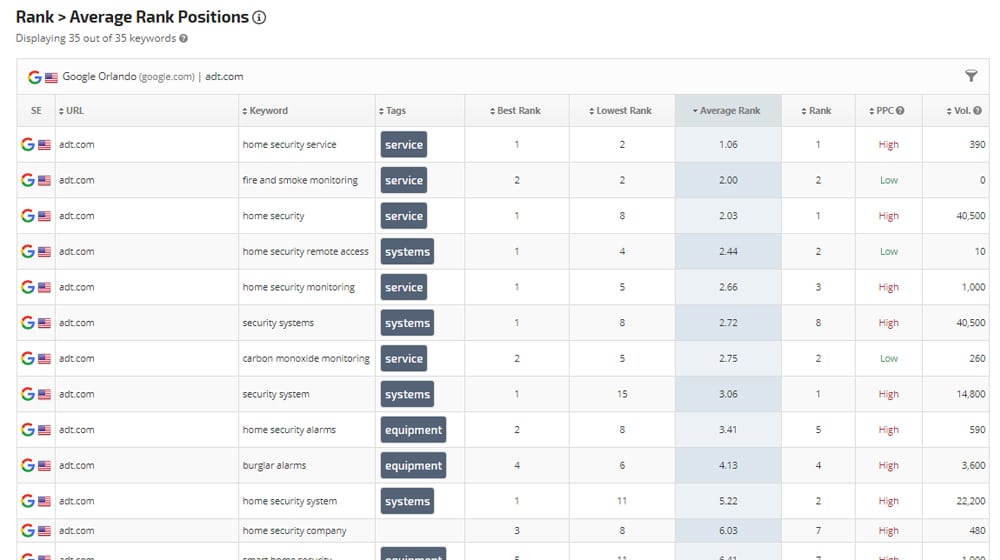
Except, if you look at things from an SEO perspective, you're actually positive. Your original three pages have not dropped in ranking at all; you just have more pages ranking. Those new pages can even grow in ranking, but even if they don't, the average looks bad.
Of course, all of this is made much more complex when you consider that one page can rank for hundreds of different keywords and can be anywhere from #1 to #whatever.
Note: In the past, Google would just give you a near-endless list of pages for search results, and you could find sites on page 100 of Google or whatever. These days, they cut you off. Different queries have different cutoff points and will end with a message like "In order to show you the most relevant results, we have omitted some entries very similar to the 172 already displayed."
Interestingly, Google then provides a link to repeat the search with omitted results included, but the results are often shorter than they were before. For example, one query I tested had 28 pages of search results, but when clicking to show omitted results, it only had 26 pages.
Is Google lying about including omitted results? Maybe. I didn't go and scrape all of the results before and after to see what changed since it's not a critical part of my thesis today, but it's interesting to know.
So, one page can have hundreds of keywords with hundreds of different rankings, and that applies to every page on your site.
What is average page ranking tracking, then? It's an official metric in the Google Search Console, so it has to mean something.
What is Average Position, Anyway?
Well, since it's Google, they're just tracking the actual queries where your site appears. When people search for something, if your site shows up in the results, that query and position are added to the list of data they average out.
In fact, you can drill down and see what queries are being used to find you, what pages are ranking and at what positions, and other parameters like device and country tracking. All of these have different data and can show different averages.
And yes, this does technically mean that if someone performs a search Google has not processed before, and your page shows up for that search, it can change your average position, without you having done or changed anything.
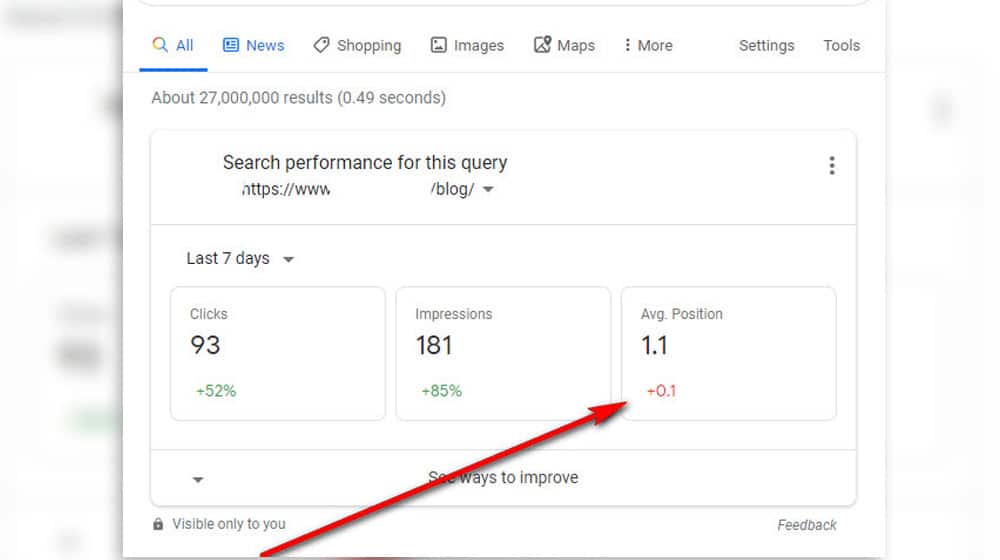
On top of that, remember that query results are personalized. When you search for a keyword, and I search for it, the order of results can be different. Google generally takes the highest position for the query they can.
One quirk of this is that it means your intended primary keyword isn't actually as impactful as you might think. If people aren't really using that keyword, it doesn't impact your ranking much. Moreover, it's just one keyword, and the average of a single post can be made up of hundreds of keywords, not to mention the average of your site as a whole.
What it does mean is that when you publish new content, especially if you're a relatively small site and you aren't just guaranteed a top-3 ranking like the big names are, each new piece of content is going to drag down your average until it climbs up and proves itself.
How to Boost Average Position
If you're looking to optimize your site to improve your average position, there are generally three ways you can approach it.
Remove or improve low-ranking content. The way averages work is just by zeroing in on the middle of a cloud of numbers. If you have a lot of pages with high numbers and a lot of pages with low numbers, you can remove the pages with low numbers, and the average will go up. You can do this with a content audit, identifying the worst-performing pages on your site and getting rid of them.
Note that this isn't necessarily going to help your site's health. I would never recommend removing pages that have traffic or valuable links, for example, because even if the average ranking is lower, they're still valuable from a business standpoint.
Similarly, a lot of low-ranking pages might be critical for other reasons, like for user documentation, store page results, or landing pages. Removing them can cause problems with other marketing.
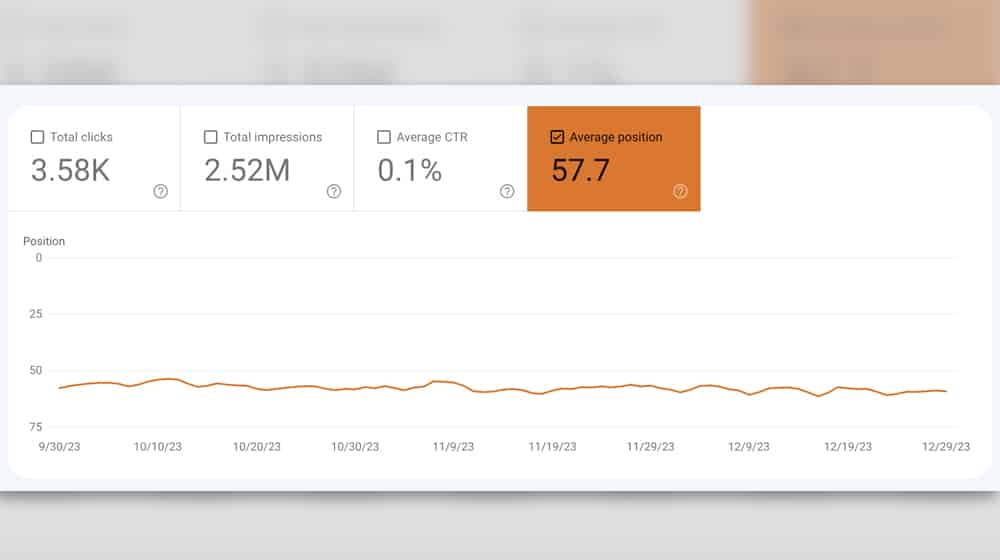
Image source: https://cdn.prod.website-files.com/5fd959607ea3c7255de76faf/66f06d5cb41f1d81717b2e9c_65916c253bc35f9e48d7e081_Screenshot%25202023-12-31%2520at%25206.26.07%25E2%2580%25AFAM.png
Narrow and tighten the focus of your content. You can usually think of your keywords across the 80:20 rule; 80% of your results come from 20% of your keywords. You can sculpt your content in ways that remove tertiary keywords, so your pages no longer rank at all for the queries that they formerly ranked poorly for.
There's only so much you can do with this, though. Because of how Google works using synonym dictionaries and semantic indexing, you'll often rank for queries using keywords that don't appear on your page at all. There's nothing you can do about that.
And, of course, even a fringe keyword with a lower ranking is still valuable to you if it brings in users or links.
Add more content optimized for higher ranking. The more content you add that ranks well, the higher you can pull up your ranking. This is usually going to be the go-to option whenever possible, though it takes a while. It also will often skew your average position downward while that content is indexed and ranks.
Is any of this worth your time or energy?
Is Average Position Useful?
All of this brings me to one of the big questions: is this piece of data even worth looking at? Google provides it front and center on your Search Console data, so it must be relevant, right?
Well, not really. In my view, it depends on how large your site is.
A small site is very susceptible to changes. One or two new pieces of content can skew your average pretty significantly. Our hypothetical site with six pages up above is a great example.
On the other hand, imagine a site like Forbes, HuffPo, Search Engine Land, or even something like Backlinko. These sites have anywhere from hundreds to hundreds of thousands of pages, all of them ranking for potentially thousands of keywords each.
When those sites publish a new piece of content, it's really not going to impact their average position. A few hundred, or even a few thousand, new pieces of data aren't going to drag down an average made up of millions of data points.
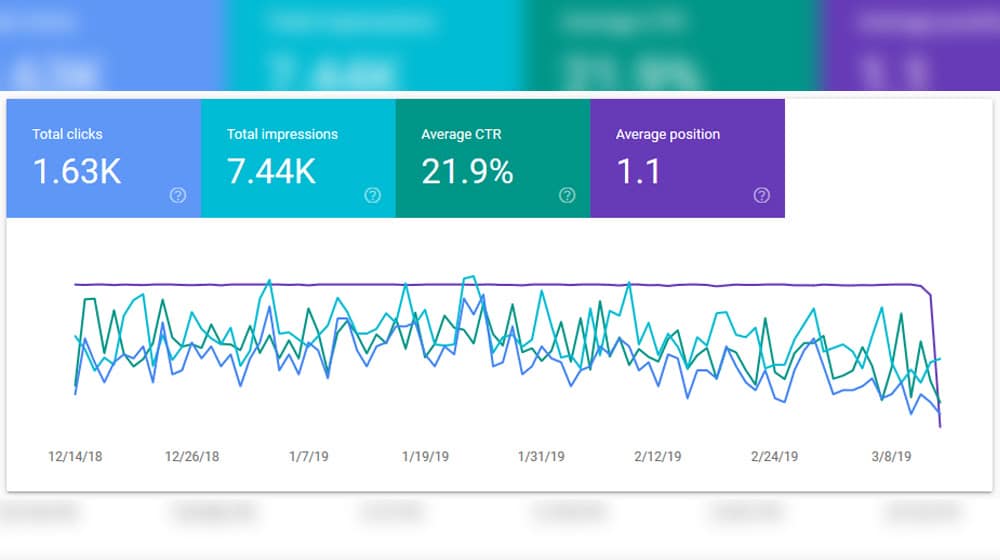
On the other hand, it's a great metric for those larger sites. If Google makes a change to its algorithm that hurts a large site or does something directly targeting that site (like the recent Forbes hit to parasite SEO), they will see a change because it impacts a ton of keywords across a ton of pages.
Think of it sort of like tracking an earthquake. One seismic sensor could trigger a huge earthquake warning just because a heavy truck drove by. When you have thousands of seismic sensors across a country, those individual blips don't matter, but the larger quakes do.
So, large sites can use it as a sort of SEO weather forecast.
For mid-sized sites, I also find that average position can be useful as a barometer for certain large, sweeping changes you might make. For example, if you do a thorough content audit and delete old, low-quality posts, you can see if your average position jumps up as a result.
At the same time, I don't think average position is one of the more important metrics to watch. It's kind of just a curiosity for most of the day-to-day marketing you'll be doing and isn't really receptive to immediate feedback outside of huge, sweeping changes or for very small sites.
What Data to Monitor Instead
If average search ranking isn't all that valuable, what should you be watching instead?
There are a bunch of more tangible metrics to watch.
Primary Keyword Ranking
Every piece of content you create is going to have a main keyword or selection of keywords you're targeting with it. Tracking the specific ranking for those keywords is often a much better indication of how your content and your site are performing in SERPs.
After all, it's a lot better to rank #3 for the main keyword you're targeting than to rank #1 for a keyword ten people search for a month, right?
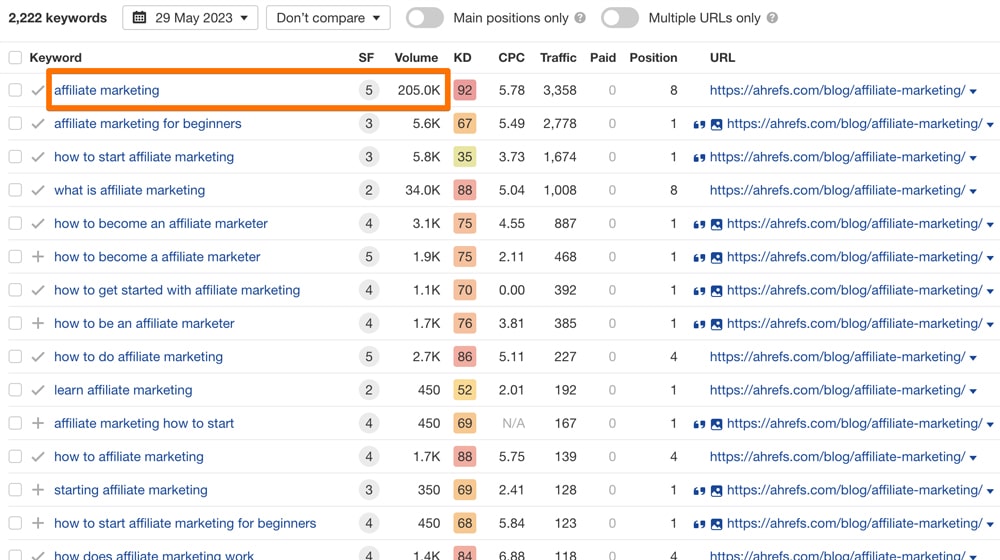
Image source: https://ahrefs.com/blog/wp-content/uploads/2023/05/primary-keyword-VS-secondary-keywords-as-shown-in-organic-keywords-report-by-Ahrefs.png
It's also relatively easy to do this with tools, though not with Google Search Console. Here's my list of my favorite rank-tracking apps, for example, though this only covers some of the many options available.
SERPs Impressions and SERPs Clicks
These two are metrics that the Google Search Console does provide.
SERPs impressions is the number of times your site shows up in the search results. You can view this site-wide, but it's usually better to view it on a per-content level so you can see individual pieces of content and how they're being viewed. Google will also show you if you're being shown in the discover feed or other mixed results like video or local pack results. It's usually a good thing to show up in these enhanced results.
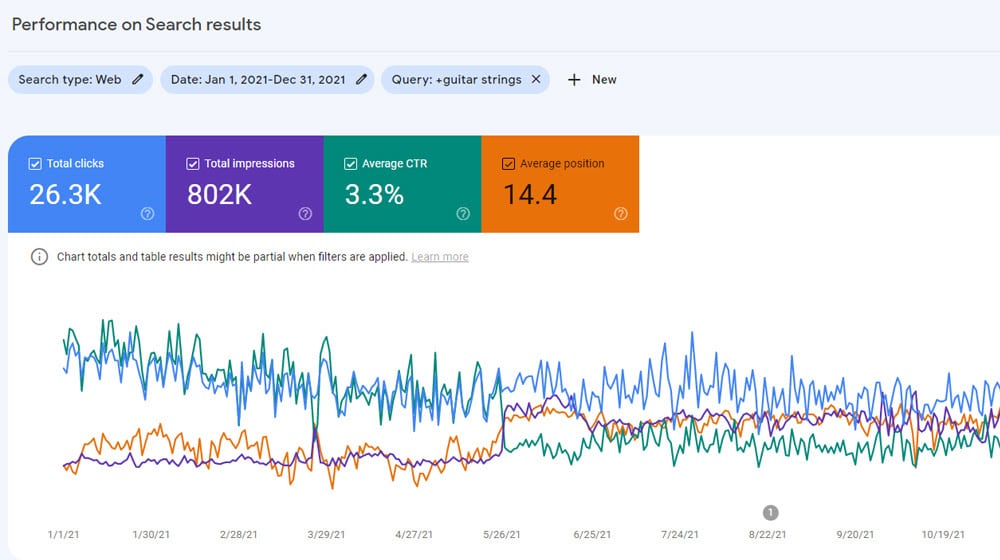
Image source: https://storage.googleapis.com/support-forums-api/attachment/thread-146658004-15005680004241862777.png
SERPs clicks is the number of people from those piles of impressions who actually click through to visit your site. Impressions are fine and dandy, but someone seeing your URL isn't actually useful to you. Having them click through is important because that's how you get them on your site, exposed to your messaging, and possibly clicking through to convert.
This is where a lot of your finer-detailed marketing efforts can show results. For example, if you split-test your post titles or meta descriptions, these metrics will show you how they affect your appearance. If impressions go up, cool! If clicks go up, excellent! If either goes down, maybe you can revert the change.
Conversion Rates
Conversion rates don't have much to do with SERPs at first glance, but they're actually a very important indicator of how well you're matching your content to the search intent of the people finding you in search. Everyone has a reason why they search, and your goal isn't just to put vaguely related words in front of them. You need to come up with something that satisfies their needs but leaves them wanting more from you, and oh hey, wouldn't you know it, here's a convenient link to get that…
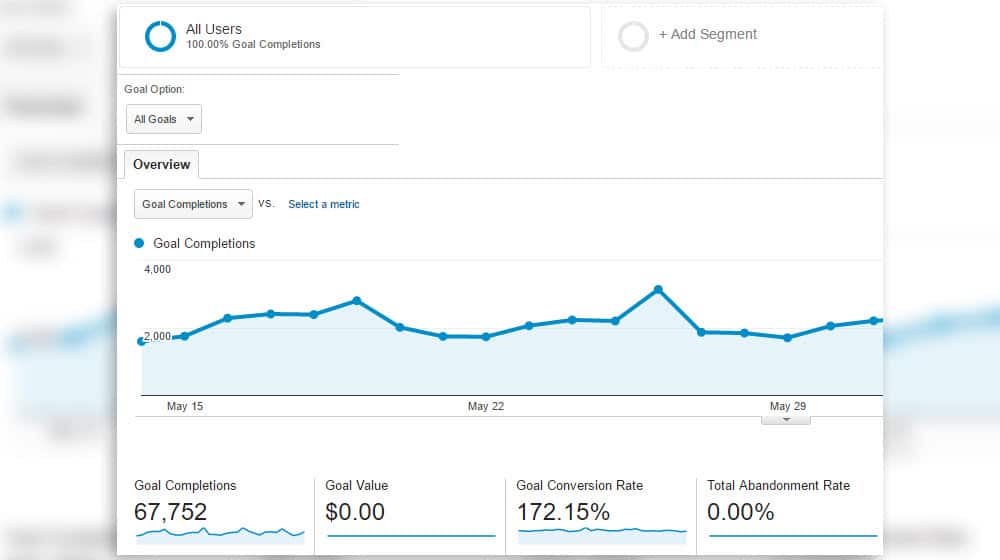
Image source: https://online-metrics.com/wp-content/uploads/2016/06/Default-Conversion-Rate.png
Optimizing conversion rates is one of the most important ongoing tasks of modern marketing, and it's way more useful to watch than something like average position site-wide.



 30 Second Summary
30 Second Summary



Comments